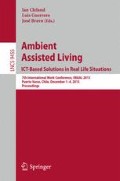Abstract
This work presents the Mining Minds Context Ontology, an ontology for the identification of human behavior. This ontology comprehensively models high-level context based on low-level information, including the user activities, locations, and emotions. The Mining Minds Context Ontology is the means to infer high-level context from the low-level information. High-level contexts can be inferred from unclassified contexts by reasoning on the Mining Minds Context Ontology. The Mining Minds Context Ontology is shown to be flexible enough to operate in real life scenarios in which emotion recognition systems may not always be available. Furthermore, it is demonstrated that the activity and the location might not be enough to detect some of the high-level contexts, and that the emotion enables a more accurate high-level context identification. This work paves the path for the future implementation of the high-level context recognition system in the Mining Minds project.
Access this chapter
Tax calculation will be finalised at checkout
Purchases are for personal use only
References
Jawbone Up (2015). https://jawbone.com/up. (Accessed 14 September 2015)
Misfit Shine (2015). http://misfit.com/products/shine. (Accessed 14 September 2015)
Baldauf, M., Dustdar, S., Rosenberg, F.: A survey on context-aware systems. Int. J. Ad Hoc Ubiquitous Comput. 2(4), 263–277 (2007)
Banos, O., Bang, J.H., Hur, T.H., Siddiqui, M., Huynh-The, T., Vui, L.-B., Ali-Khan, W., Ali, T., Villalonga, C., Lee, S.: Mining human behavior for health promotion. In: Proceedings of the 37th Annual International Conference of the IEEE Engineering in Medicine and Biology Society (EMBC 2015) (2015)
Banos, O., Amin, M.B., Khan, W.A., Afzel, M., Ahmad, M., Ali, M., Ali, T., Ali, R., Bilal, M., Han, M., Hussain, J., Hussain, M., Hussain, S., Hur, T.H., Bang, J.H., Huynh-The, T., Idris, M., Kang, D.W., Park, S.B., Siddiqui, H., Vui, L.-B., Fahim, M., Khattak, A.M., Kang, B.H., Lee, S.: An innovative platform for person-centric health and wellness support. In: Ortuño, F., Rojas, I. (eds.) IWBBIO 2015, Part II. LNCS, vol. 9044, pp. 131–140. Springer, Heidelberg (2015)
Banos, O., Bilal-Amin, M., Ali-Khan, W., Afzel, M., Ali, T., Kang, B.-H., Lee, S.: The mining minds platform: a novel person-centered digital health and wellness framework. In: Proceedings of the 9th International Conference on Pervasive Computing Technologies for Healthcare (2015)
Banos, O., Damas, M., Pomares, H., Prieto, A., Rojas, I.: Daily living activity recognition based on statistical feature quality group selection. Expert Syst. Appl. 39(9), 8013–8021 (2012)
Chen, H., Finin, T., Joshi, A.: An ontology for context-aware pervasive computing environments. Knowl. Eng. Rev. 18(03), 197–207 (2003)
Chen, H., Finin, T., Joshi, A.: The soupa ontology for pervasive computing. In: Tamma, V., Cranefield, S., Finin, T.W., Willmott, S. (eds.) Ontologies for Agents: Theory and Experiences, pp. 233–258. Birkhäuser, Basel (2005)
Datcu, D., Rothkrantz, L.: Semantic audio-visual data fusion for automatic emotion recognition. Emotion Recognition: A Pattern Analysis Approach, pp. 411–435 (2014)
Hervás, R., Bravo, J., Fontecha, J.: A context model based on ontological languages: a proposal for information visualization. J. UCS 16(12), 1539–1555 (2010)
Liao, L., Fox, D., Kautz, H.: Extracting places and activities from GPS traces using hierarchical conditional random fields. Int. J. Robot. Res. 26(1), 119–134 (2007)
Lin, Q., Zhang, D., Huang, X., Ni, H., Zhou, X.: Detecting wandering behavior based on GPS traces for elders with dementia. In: 12th International Conference on Control Automation Robotics & Vision, pp. 672–677. IEEE (2012)
Mannini, A., Intille, S.S., Rosenberger, M., Sabatini, A.M., Haskell, W.: Activity recognition using a single accelerometer placed at the wrist or ankle. Med. Sci. Sports Exerc. 45(11), 2193–2203 (2013)
Poveda Villalon, M., Suárez-Figueroa, M.C., García-Castro, R., Gómez-Pérez, A.: A context ontology for mobile environments. In: Proceedings of Workshop on Context, Information and Ontologies, CEUR-WS (2010)
Preuveneers, D., et al.: Towards an extensible context ontology for ambient intelligence. In: Markopoulos, P., Eggen, B., Aarts, E., Crowley, J.L. (eds.) EUSAI 2004. LNCS, vol. 3295, pp. 148–159. Springer, Heidelberg (2004)
Ribeiro, P., Santos-Victor, J.: Human activity recognition from video: modeling, feature selection and classification architecture. In: Proceedings of International Workshop on Human Activity Recognition and Modelling, pp. 61–78. Citeseer (2005)
Riboni, D., Bettini, C.: COSAR: hybrid reasoning for context-aware activity recognition. Pers. Ubiquit. Comput. 15(3), 271–289 (2011)
Mohsin Saleemi, M., Díaz Rodríguez, N., Lilius, J., Porres, I.: A framework for context-aware applications for smart spaces. In: Balandin, S., Koucheryavy, Y., Hu, H. (eds.) NEW2AN 2011 and ruSMART 2011. LNCS, vol. 6869, pp. 14–25. Springer, Heidelberg (2011)
Wang, X.H., Zhang, D.Q., Gu, T., Pung, H.K.: Ontology based context modeling and reasoning using owl. In: Proceedings of the Second IEEE Annual Conference on Pervasive Computing and Communications Workshops, pp. 18–22. IEEE (2004)
Acknowledgments
This work was supported by the Industrial Core Technology Development Program, funded by the Korean Ministry of Trade, Industry and Energy (MOTIE), under grant number #10049079.This work was also supported by the Junta de Andalucia Project P12-TIC-2082 and the grant “Movilidad Internacional de Jóvenes Investigadores de Programas de Doctorado Universidad de Granada y CEI BioTic”.
Author information
Authors and Affiliations
Corresponding author
Editor information
Editors and Affiliations
Rights and permissions
Copyright information
© 2015 Springer International Publishing Switzerland
About this paper
Cite this paper
Villalonga, C. et al. (2015). High-Level Context Inference for Human Behavior Identification. In: Cleland, I., Guerrero, L., Bravo, J. (eds) Ambient Assisted Living. ICT-based Solutions in Real Life Situations. IWAAL 2015. Lecture Notes in Computer Science(), vol 9455. Springer, Cham. https://doi.org/10.1007/978-3-319-26410-3_16
Download citation
DOI: https://doi.org/10.1007/978-3-319-26410-3_16
Published:
Publisher Name: Springer, Cham
Print ISBN: 978-3-319-26409-7
Online ISBN: 978-3-319-26410-3
eBook Packages: Computer ScienceComputer Science (R0)

